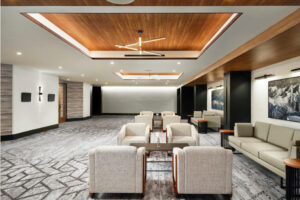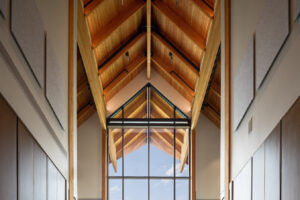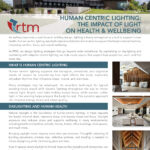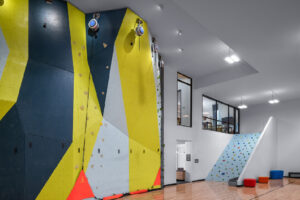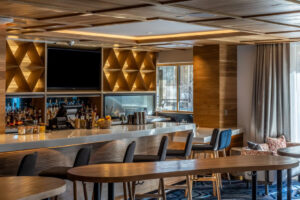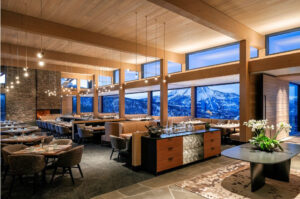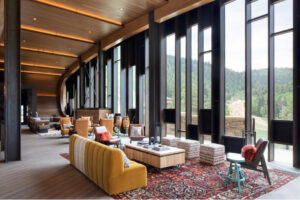As wellness becomes a core focus in building design, lighting is being reimagined as a tool to support human health. Human centric lighting uses both natural and electric illumination to support the body’s internal rhythms, improving comfort, focus, and overall wellbeing.
At RTM, we design lighting strategies that go beyond code compliance. By capitalizing on daylighting and combining with adaptive electric lighting, we help create spaces that support how people live, work, and feel every day.
WHAT IS HUMAN CENTRIC LIGHTING
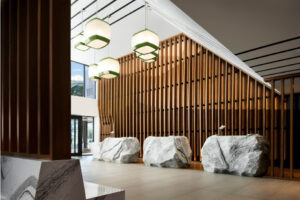 Human centric lighting supports the biological, emotional, and cognitive needs of people by considering how light affects the body, especially circadian rhythms that influence sleep, mood, and alertness.
Human centric lighting supports the biological, emotional, and cognitive needs of people by considering how light affects the body, especially circadian rhythms that influence sleep, mood, and alertness.
Many strategies may be employed. An excellent technique for typical working hours would shift electric lighting throughout the day to mirror natural light. Bright, cool light midday boosts focus, while warmer, softer light in the evening helps prepare the body for rest. This dynamic approach can improve energy levels and sleep quality.
DAYLIGHTING AND HUMAN HEALTH
Natural daylight is the foundation of human-centric lighting. It helps regulate the body’s internal clock, improves sleep, and boosts mood and focus. Daylight exposure also reduces stress and supports wellbeing in many environments, including healthcare facilities, schools, homes, hotels, office buildings, retail spaces, and much more.
Bringing daylight inside requires more than just windows. Thoughtful planning of building placement, window size, reflective surfaces, and shading is needed to infuse daylighting while minimizing glare and heat.
Even in spaces where daylight is limited, features like skylights and clerestories, can bring natural light deeper into interiors without sacrificing privacy or wall space.
There is simply no artificial lighting application which rivals adequate daylight exposure for wellbeing.
TUNABLE ELECTRIC LIGHTING
Electric lighting plays a key role when natural light is limited or when schedules inhibit access. Tunable lighting systems can adjust brightness and color independently to better promote the body’s natural rhythms.
In schools, cooler light in the morning can boost focus, while warmer color temperatures during break times will promote calm. In healthcare settings, tunable lighting supports sleep cycles and reduces stress for patients indoors. It can also be used to enhance shift worker environments.
These systems can be manually adjusted, or programmed, to respond automatically to daylight, occupancy, and user preferences, creating flexible and comfortable environments.
BENEFITS OF EARLY DETECTION
- Health & Wellbeing: Lighting that supports better sleep, mood, focus, and long-term health.
- Energy Efficiency: Systems that reduce energy use without sacrificing comfort.
- Design Flexibility: Solutions that work in a wide range of building types and offer a multitude of end-user functions.
- Certification Support: Strategies aligned with WELL and LEED.
ENSURING COMFORT & PERFORMANCE
Human centric lighting is more than a design trend. It supports the way people live, work, learn, and heal. At RTM, our lighting designers and engineering professionals collaborate to create spaces that are visually comfortable, energy efficient, and focused on occupant wellbeing.
Our team continually educates themselves on the latest technologies, industry standards, and research to deliver the most effective and up-to-date lighting solutions. Combining tunable lighting technology and sophisticated lighting controls in specific applications, we develop solutions that offer maximum flexibility and end-user control.
Across market sectors, we deliver lighting strategies that provide lasting value.
MEET ONE OF OUR LIGHTING DESIGN EXPERTS

With over 17 years of experience, Anna-Lisa applies her lighting expertise with a focus on user experience, collaborating closely with teams to deliver thoughtful, human-centered solutions that enhance comfort and wellbeing.

